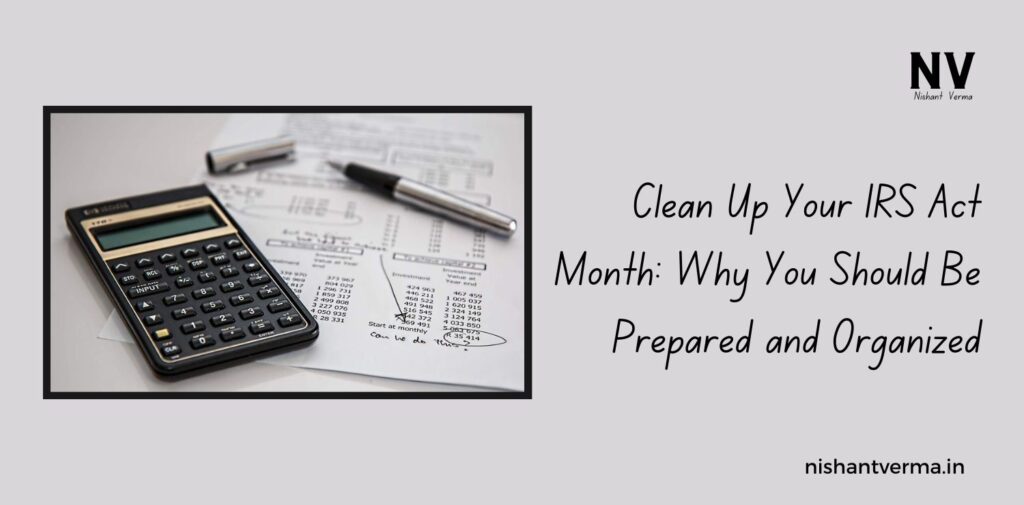Taxation is a vital part of the financial system in any country, and in India, it plays a crucial role in funding government initiatives and services. For many Indians, tax season is a time of confusion, stress, and often last-minute scrambling to gather all necessary documents and information. However, the concept of “Clean Up Your IRS Act Month” offers a way to avoid this hassle by encouraging individuals and businesses to be prepared and organized well before the tax deadline.
Though the IRS (Internal Revenue Service) is specific to the United States, the idea of “cleaning up” your tax-related documents and activities applies universally. In India, the equivalent of the IRS is the Income Tax Department, and just like in any other country, it is essential to stay on top of tax responsibilities to avoid unnecessary stress, penalties, or legal issues.
In this article, we will explore the importance of organizing your taxes, why a “clean-up” is necessary, and the steps you can take to get your financial documents in order before the deadline.
What is Clean Up Your IRS Act Month?
Clean Up Your IRS Act Month is a campaign or concept that encourages individuals and businesses to get their tax records and financial documentation in order before the filing season begins. While the term IRS is specific to the United States, this idea is equally relevant to the Indian tax system. It’s about being proactive, staying organized, and ensuring that everything is in place when it’s time to file your tax returns.
In India, tax filing season typically starts in April and ends in July for individual taxpayers. However, rather than waiting until the last minute, it’s always better to clean up and organize your tax records well in advance. This way, when the time comes to file your returns, you’ll have everything ready, and the process will be much smoother.

Why is it Important to Clean Up Your Tax Act?
Getting your tax records and documents organized is essential for several reasons. Let’s look at some of the key benefits of cleaning up your tax act:
- Avoiding Penalties and Interest: If you miss important deadlines, fail to file your tax returns on time, or make errors in your returns, you may face penalties and interest. By staying organized and ahead of the filing season, you ensure that you meet deadlines and submit accurate information, reducing the chances of financial penalties.
- Easy Access to Financial Documents: Cleaning up your tax records means having easy access to your financial documents, such as bank statements, proof of investments, and details of income. This reduces last-minute searching and stress during the filing season. It also helps you avoid errors or missing out on important deductions or exemptions.
- Maximizing Deductions and Exemptions: The Indian tax system allows various deductions and exemptions under different sections of the Income Tax Act (like Section 80C, 80D, etc.). Being organized allows you to review all possible deductions, such as investments in life insurance, pension funds, or health insurance premiums. By keeping track of these documents throughout the year, you’ll ensure that you don’t miss out on opportunities to reduce your tax burden.
- Streamlining the Filing Process: If you have all your documents in place, filing your income tax returns (ITR) becomes a much simpler process. Whether you are filing manually or using an online portal, having organized documents will save you time and effort, allowing you to file your return without unnecessary complications.
- Peace of Mind: Tax season can be stressful, but when you’re organized and prepared, it takes away much of the anxiety associated with tax filing. By setting aside time each year to clean up your tax records, you can go into the tax season with confidence, knowing that everything is in order.

Steps to Clean Up Your Tax Act
Cleaning up your IRS (or Income Tax) act doesn’t have to be overwhelming. By following a few simple steps, you can stay organized and be well-prepared for the tax season. Here are the steps you can take to organize your tax documents and financial records in India:
Review Your Income Sources: The first step in cleaning up your tax act is to review all your sources of income. In India, income can come from various sources, including:
- Salaries and Wages
- If you are employed, you should have a Form 16 issued by your employer. This form provides a detailed breakdown of your income and tax deductions.
- Business or Freelance Income
- If you are self-employed or a freelancer, gather all invoices, receipts, and details of business income. Keep track of your expenses too, as they may be deductible.
- Investments and Savings
- Review the interest you’ve earned from fixed deposits (FDs), savings accounts, or post office schemes. You’ll need to report this income and may be eligible for tax deductions on interest earned on certain investments.
- Rental Income
- If you own rental properties, keep records of rental income received, property-related expenses, and maintenance costs.
Organize Your Deductions and Exemptions: The Indian tax system offers various deductions and exemptions that can help reduce your taxable income. These include deductions for investments in life insurance, ELSS mutual funds, National Pension Scheme (NPS), and health insurance premiums. Here’s how to stay organized:
- Gather Proof of Investments: Collect receipts and proof of contributions to tax-saving instruments such as PPF, NSC, or tax-saving FDs.
- Health Insurance: If you or your family members have purchased health insurance, keep the policy details and premium receipts handy for tax benefits under Section 80D.
- Home Loan: If you are repaying a home loan, keep a record of the loan statements showing principal and interest payments for claiming deductions under Section 80C and Section 24.
Maintain Accurate Bank and Investment Statements: Keep a record of your bank statements, fixed deposits, mutual fund statements, and any other financial documents that reflect your income or investments. These will help you in calculating your income, interest, and capital gains when filing your return.
- Download your bank statements for the year.
- Get updated statements from your mutual fund providers, and keep track of any capital gains from investments in stocks or bonds.
- Track dividend income received from stocks or mutual funds.

Cross-check Tax Payments: If you’ve made advance tax payments or tax deducted at source (TDS), ensure that these amounts are reflected in your records. You can find these details on your Form 26AS (a statement provided by the Income Tax Department that summarizes your tax-related information).
Use Technology and Tax Filing Tools: The Income Tax Department provides an online portal where you can file your returns and check the status of your payments. Use the tools available on the portal to simplify the filing process. You can also use apps or software to track your finances, such as ClearTax or TaxSpanner, which can make the process smoother.
Seek Professional Help if Necessary: If your financial situation is complex, or you are unsure about any aspect of tax filing, consider consulting a tax expert or chartered accountant (CA). They can help you ensure that you are claiming all eligible deductions and filing your taxes correctly.
Conclusion: Start Now for a Stress-Free Tax Season
Cleaning up your tax records and organizing your financial documents well before the tax season is essential for a smooth filing process. By reviewing your income, collecting receipts for deductions, and keeping track of your investments, you will be prepared and avoid unnecessary stress.
In India, tax season can be overwhelming, but it doesn’t have to be. By following a few simple steps during Clean Up Your IRS Act Month, you can stay on top of your tax responsibilities, maximize deductions, and file your returns on time. So, take charge of your finances today, and ensure that you’re ready for the tax season well in advance!




